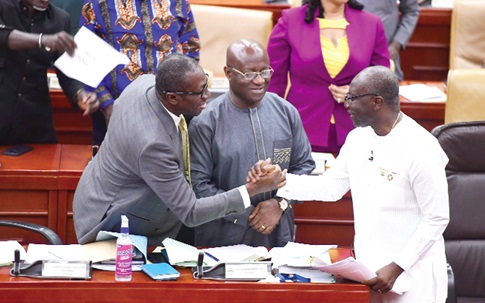
The government has announced a raft of tax measures, including reductions, to cushion citizens as the economy leaps gradually from recovery to stability.
The measures include zero-rated Value Added Tax (VAT) on locally produced sanitary pads for five years, import duty waivers on raw materials for local manufacture of sanitary pads for five years, tax-free portion of individual income tax rates to be adjusted and engaging the Ghana Medical Association on waivers for importation of vehicles.
The others are to extend zero rate of VAT on locally manufactured African prints for two years, review and expand the environmental excise duty to cover plastic packaging; and industrial and vehicle emissions and review the rates and fees for stamp duties.
The rest are waiver of import duties on semi-knocked down electric vehicles imported by registered EV assembly companies in the country for eight years, waiver of import duties on import of electric vehicles for public and private transportation for eight years, a waiver of import duties on completely knocked-down EV imported by registered EV assembly companies in Ghana for eight years as well as the introduction of a simplified tax return as a means of promoting voluntary compliance.
Budget laid
These were contained in the 2024 Budget Statement and Economic Policy of the government presented to Parliament yesterday, seeking approval to raise GH¢176.4 billion in total revenue and grants, equivalent to 16.8 per cent of Gross Domestic Product (GDP).
The budget, the last for the President Akufo-Addo administration and the first backed by the International Monetary Fund programme since 2019, is on the theme: “Nkunim’, or victory budget.
When approved and the Appropriation Bill passed, the minister of finance, who moved the motion for the budget approval, would also have the authorisation to spend GH¢226.7 billion, about 21.6 per cent of GDP, which the finance minister said was a reduction of 6.1 percentage points of GDP in total expenditures (commitment basis) relative to the outturn in 2022.
He said the large decrease came from the combination of fiscal consolidation efforts of 4.9 percentage points of GDP, reflecting an adjustment in revenue by 1.0 percentage point and primary expenditure by 4.0 percentage point of GDP.
“The potential interest rate saving from the ongoing external debt operation will further bolster public finance sustainability,” Mr Ofori-Atta told Parliament.
He said the government would extend zero-rated VAT on locally assembled vehicles for two years, grant exemptions on the importation of agricultural machinery equipment and inputs and introduce a VAT flat rate of five per cent to replace the 15 per cent standard VAT rate on all commercial properties.
Atmosphere
Wearing his signature all-white kaftan, the finance minister eloquently read out the government’s economic policy as well as the revenue measures, and expenditure estimates for the next year, detailing how the government intended to rake in more revenue domestically, without further burdening the taxpayer and measures to address the country’s debt position.
The 2024 Government’s economic and policy statement was dubbed: the “Nkunim” (victory) Budget.
Sitting in the public gallery of Parliament were some members of the national executive of the governing New Patriotic Party (NPP), including the National Chairman, Stephen Ntim.
The Chief of Staff of the Office of the President, Akosua Frema Osei-Opare, and the Senior Presidential Advisor, Yaw Osafo-Maafo, were also present.
The atmosphere in the House was tense as some members of the opposition booed and heckled the finance minister every now and then, while the Majority side cheered him on occasionally.
Despite the interruptions, the finance minister outlined the government’s plans for economic growth, social welfare protection, and infrastructure development.
Growth strategy
The government’s growth strategy, Mr Ofori-Atta said, supported the interventions that increased the country’s capacity to produce, deepen value-chains, facilitate and modernise storage facilities as well as increase the shelf-life of products.
Those improvements, he stated, were expected to help support exports, build foreign exchange buffers and reduce inflation.
“Key operations under One-District, One-Factory (1D1F), Free Zones companies, export promotion, strategic anchor industries and Business Regulatory Reforms have been prioritised under the growth strategy,” Mr Ofori-Atta said.
Altogether, earnings from non-traditional exports were expected to increase to $4 billion this year and $4.8 billion next year from $3.51 billion as compared to 2022.
He said 271 licensed free zone companies were expected to increase earnings to $2.19 billion in 2024, compared to earnings of $1.8 billion from 207 licensed free zones companies in 2022,” he said.
Youth employment
Regarding the YouStart programme, Mr Ofori-Atta said the preparatory works for the programme, which was launched exactly a year ago on November 14, had been completed and that the three components of the initiative – YouStart District Entrepreneurship Programme (DEP), Commercial Programme (CP) and the YouStart Grace programme- had also been developed and piloted successfully.
He said on September 20, last year, the government signed a memorandum of understanding with 11 banks and the Ghana Association of Bankers to support entrepreneurs to gain access to capital to enhance their businesses.
Participants
“The Ghana Association of Banks has worked with us to train the financial institutions involved in the programme and have completed the design of a technology platform to receive applications,” the minister said.
Mr Ofori-Atta added that the National Banking College had also been engaged under the programme to train beneficiaries on behalf of the banks involved.
Moreover, he said, the Ghana Enterprises Agency (GEA) and the National Entrepreneurship and Innovation Programme (NEIP) had been brought together as a cohesive unit to co-lead the District Entrepreneurship component of YouStart.
The finance minister said as of October, 2023, 23,695 beneficiaries, comprising 5,183 males and 18,512 females, had completed the basic level training by the Ghana Enterprises Agency (GEA) under the YouStart Jobs and Skills project.
“Out of this number, 7,975, comprising 2,474 males and 5,501 females, progressed and completed the intermediate level training, with 4,514 beneficiaries, comprising 1,679 males and 2,835 females, also progressing to the advance level,” Mr Ofori-Atta said.
He said the GEA had commenced disbursement of grants to beneficiaries, who had completed the intermediate and advanced levels.
Evaluation
The evaluation of the grant proposals, he said, was currently ongoing and that it was expected that, at least, 5,000 of the first batch of beneficiaries would be supported with startup grants.
Aside from that, he said the National Entrepreneurship Innovation Programme (NEIP) had also trained 2,000 beneficiaries under the government sponsored YouStart DEP.
“Mr Speaker, all is set to accelerate the implementation of YouStart in the 2024.
We are working with our partners, the World Bank, to secure a financing worth $150 million.
On our own, we are committing GH¢200 million to ensure that more young persons are supported into entrepreneurship,” Mr Ofori-Atta emphasised.
He said the government intended to achieve its objectives through increasing the lending volume of the Development Bank, Ghana (DBG) to GH¢2 billion, to enable them to focus on medium and long-term lending for commercially viable private sector projects.
The DBG, he said, would also provide partial guarantees to reduce risk and attract more investment from the private sector into manufacturing, information and communication technology (ICT), and high-value services and that government would, in addition, support DBG fundraising of an additional $1 billion in 2024 and 2025.
Again, GIRSAL would provide GH¢350 million partial risks guarantee to leverage private sector participation in the agricultural sector and agri-business.
Relying on the GH¢350 million guarantee, the minister said banks would be able to provide about GH¢700 million to the agricultural sector and agri-business.
Mutual Prosperity Dialogue
The minister of finance said the government would negotiate for $500 million financing from the World Bank’s International Finance Corporation (IFC), a partner of the Ghana Mutual Prosperity Dialogue.
On recapitalisation of banks, the government was again pursuing World Bank support to recapitalise banks through the Ghana Financial Stability Fund with over GH¢10 billion to enable aggressive financing of private sector businesses.
“Furthermore, the Venture Capital Trust Fund would commit an additional $13 million.
This follows the $11 million the VCTF committed in 2023,” Mr Ofori-Atta said.
Mr Ofori-Atta added that the National Banking College had also been engaged under the programme to train beneficiaries on behalf of the banks involved.
Moreover, he said, the Ghana Enterprises Agency (GEA) and the National Entrepreneurship and Innovation Programme (NEIP) had been brought together as a cohesive unit to co-lead the District Entrepreneurship component of YouStart.
The finance minister said as of October 2023, 23,695 beneficiaries, comprising 5,183 males and 18,512 females, had completed the basic level training by the Ghana Enterprises Agency (GEA) under the You Start Jobs and Skills project.
“Out of this number, 7,975, comprising 2,474 males and 5,501 females, progressed and completed the intermediate level training, with 4,514 beneficiaries, comprising 1,679 males and 2,835 females, also progressing to the advance level,” Mr Ofori-Atta said.
He said the GEA had commenced disbursement of grants to beneficiaries, who had completed the intermediate and advanced levels.
Evaluation
The evaluation of the grant proposals, he said, was currently ongoing and that it was expected that, at least, 5,000 of the first batch of beneficiaries would be supported with startup grants.
Aside from that, he said the National Entrepreneurship Innovation Programme (NEIP) had also trained 2,000 beneficiaries under the government sponsored YouStart DEP.
“Mr Speaker, all is set to accelerate the implementation of YouStart in the 2024.
We are working with our partners, the World Bank, to secure a financing worth $150 million.
On our own, we are committing GH¢200 million to ensure that more young persons are supported into entrepreneurship,” Mr Ofori-Atta emphasised.
He said the government intended to achieve its objectives through increasing the lending volume of the Development Bank, Ghana (DBG) to GH¢2 billion, to enable them to focus on medium and long-term lending for commercially viable private sector projects.
The DBG, he said, would also provide partial guarantees to reduce risk and attract more investment from the private sector into manufacturing, information and communication technology (ICT), and high-value services and that government would, in addition, support DBG fundraising of an additional $1 billion in 2024 and 2025.
Again, GIRSAL would provide GH¢350 million partial risks guarantee to leverage private sector participation in the agricultural sector and agri-business.
Relying on the GH¢350 million guarantee, the minister said banks would be able to provide about GH¢700 million to the agricultural sector and agri-business.
Mutual Prosperity Dialogue
The minister of finance said the government would negotiate for $500 million financing from the World Bank’s International Finance Corporation (IFC), a partner of the Ghana Mutual Prosperity Dialogue.
On recapitalisation of banks, the government was again pursuing World Bank support to recapitalise banks through the Ghana Financial Stability Fund with over GH¢10 billion to enable aggressive financing of private sector businesses.
“Furthermore, the Venture Capital Trust Fund would commit an additional $13 million.
This follows the $11 million the VCTF committed in 2023,” Mr Ofori-Atta said.
Source: graphic.com.gh
